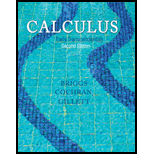
Evaluating an infinite series Write the Taylor series for f(x) = ln (1 + x) about 0 and find its interval of convergence. Assume the Taylor series converges to f on the interval of convergence. Evaluate f(1) to find the value of
Want to see the full answer?
Check out a sample textbook solution
Chapter 9 Solutions
Calculus: Early Transcendentals (2nd Edition)
Additional Math Textbook Solutions
College Algebra with Modeling & Visualization (5th Edition)
Elementary Statistics (13th Edition)
Intro Stats, Books a la Carte Edition (5th Edition)
Basic Business Statistics, Student Value Edition
Elementary Statistics
A Problem Solving Approach To Mathematics For Elementary School Teachers (13th Edition)
- 4. Some psychologists contend that the number of facts of a certain type that are remembered after t hours is given by f(t)== 90t 951-90 Find the rate at which the number of facts remembered is changing after 1 hour and after 10 hours. Interpret.arrow_forward12:05 MA S 58 58. If f(x) = ci.metaproxy.org 25 2xon [0, 10] and n is a positive integer, then there is some Riemann sum Sthat equals the exact area under the graph of ƒ from x = Oto x = 10. 59. If the area under the graph of fon [a, b] is equal to both the left sum L, and the right sum Rfor some positive integer n, then fis constant on [a, b]. 60. If ƒ is a decreasing function on [a, b], then the area under the graph of fis greater than the left sum Land less than the right sum R₂, for any positive integer n. Problems 61 and 62 refer to the following figure showing two parcels of land along a river: River Parcel 2 Parcel 1 h(x) 500 ft 1,000 ft. Figure for 61 and 62 61. You want to purchase both parcels of land shown in the figure and make a quick check on their combined area. There is no equation for the river frontage, so you use the average of the left and right sums of rectangles covering the area. The 1,000-foot baseline is divided into 10 equal parts. At the end of each…arrow_forwardIf a snowball melts so that its surface area decreases at a rate of 10 cm²/min, find the rate (in cm/min) at which the diameter decreases when the diameter is 12 cm. (Round your answer to three decimal places.) cm/minarrow_forward
- 1) let X: N R be a sequence and let Y: N+R be the squence obtained from x by di scarding the first meN terms of x in other words Y(n) = x(m+h) then X converges to L If and only is y converges to L- 11) let Xn = cos(n) where nyo prove D2-1 that lim xn = 0 by def. h→00 ii) prove that for any irrational numbers ther exsist asquence of rational numbers (xn) converg to S.arrow_forward4.2 Product and Quotient Rules 1. 9(x)=125+1 y14+2 Use the product and/or quotient rule to find the derivative of each function. a. g(x)= b. y (2x-3)(x-1) c. y== 3x-4 √xarrow_forward4.2 Product and Quotient Rules 1. Use the product and/or quotient rule to find the derivative of each function. 2.5 a. g(x)=+1 y14+2 √x-1) b. y=(2x-3)(x-:arrow_forward
- 3. The total profit (in dollars) from selling x watches is P(x)=0.52x²-0.0002x². Find and interpret the following. a) P(100) b) P'(100)arrow_forward3. Find the slope and the equation of the tangent line to the graph of the given function at the given value of x. -4 f(x)=x-x³;x=2arrow_forward2. Find the equation of the tangent line to the graph of the given function at the given point. f(x)=(x+3)(2x²-6) at (1,-16)arrow_forward
- 6. Researchers who have been studying the alarming rate at which the level of the Dead Sea has been dropping have shown that the density d (x) (in g per cm³) of the Dead Sea brine during evaporation can be estimated by the function d(x)=1.66 0.90x+0.47x², where x is the fraction of the remaining brine, 0≤x≤1. a) Estimate the density of the brine when 60% of the brine remains. b) Find and interpret the instantaneous rate of change of the density when 60% of the brine remains.arrow_forward5. If g'(5) 10 and h'(5)=-4, find f'(5) for f(x)=4g(x)-2h(x)+3.arrow_forward2. Find each derivative. Write answers with positive exponents. a) Dx 9x -3 [97] b) f'(3) if f(x) = x²-5x² 8arrow_forward
- Algebra & Trigonometry with Analytic GeometryAlgebraISBN:9781133382119Author:SwokowskiPublisher:Cengage


